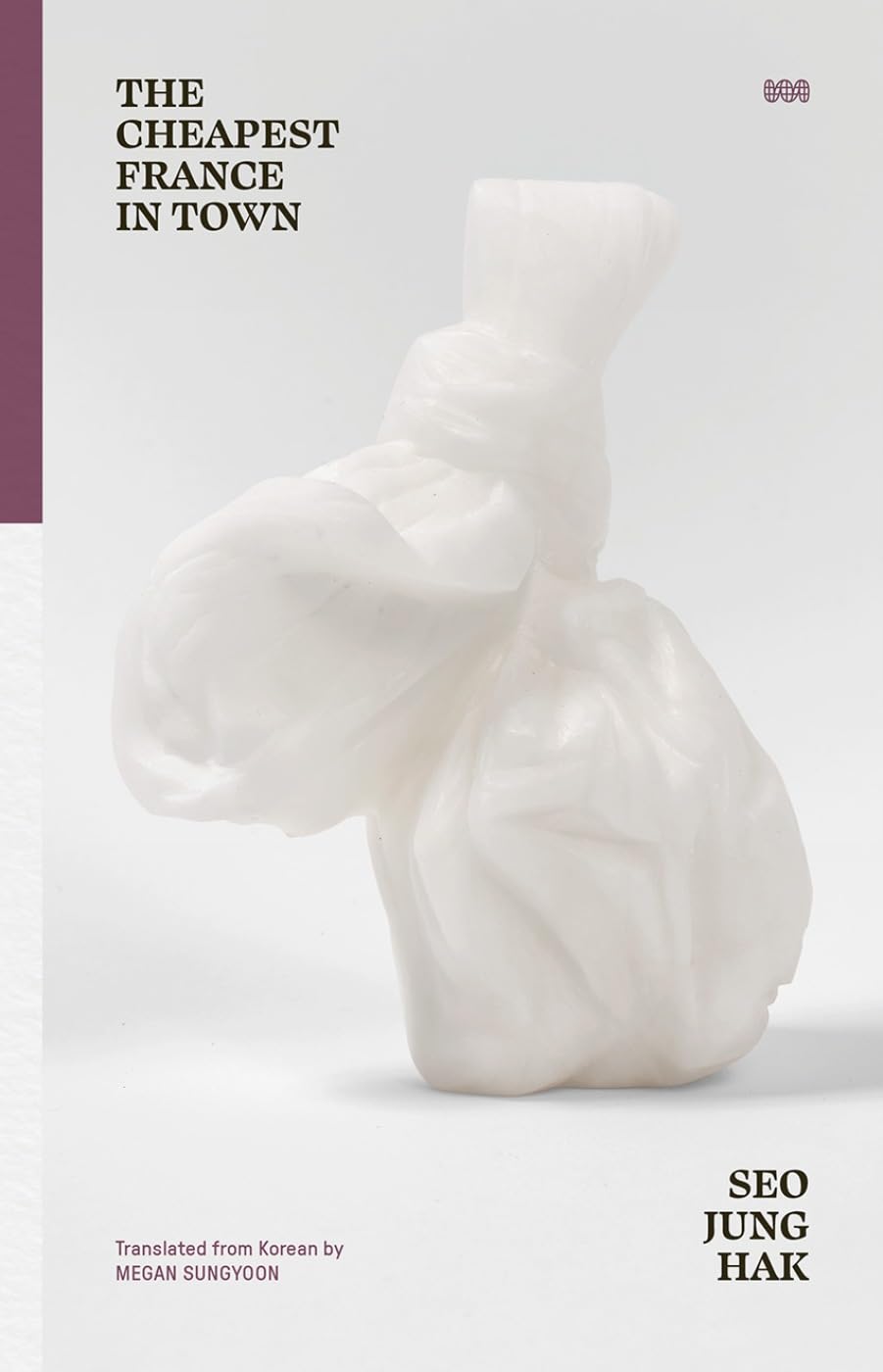Seo Jung Hak
Translated by Megan Sungyoon
World Poetry ($20)

by John Bradley
“The value of this book is, at present, the same as the lowest online-exclusive price for a half box of thirty Shin instant noodles,” deadpans Seo Jung Hak in his introduction to The Cheapest France in Town, a collection of prose poems. Even before reading a single poem, the reader has entered Seo’s world of the absurd. The author gleefully takes apart logic in the thirty-four poems (and a foldout poem) in this subversive bilingual edition.
For those who believe that the prose poem has been thoroughly explored, many surprises await. One innovation of Seo’s is to offer two versions of the same prose poem: “There’s Nothing Between Us” and “There’s Nothing Between Barns” appear on the same page, the texts almost identical—but wherever the first uses the word “barn,” the second uses “us.” For example, “The scent of lilac seeping into our faces sent the barn up in flames” in the first becomes “The scent of lilac seeped into our face sent us up in flames” in the second. Such a small change, with a tense shift, produces surreal results.
Even more innovative is the foldout poem at the back of the book that makes a small box (or rather two boxes—one in Korean and one in English). Seo’s obsession with boxes, those reliable tools of consumerism, becomes literal here as the reader is given the opportunity to construct their very own paper box adorned with poetry. One box fold reads: “If you order online, / two copies of the / book / with / his awkward smile / will be delivered / in a paper box.” As Seo enjoys satirizing familiar enticements, he is not above subverting even the title of a poem, that sacrosanct entity so vital to the reader; the title “You’re Necessities” plays with “your” and “you’re,” a distinction that bedevils many English speakers.
Not content with subverting prose poem expectations and language conventions, Hak also problematizes punctuation, mainly by violating the proper use of the comma. While the reader may at first believe these odd commas are typos, Megan Sungyoon points out deeper resonances in her translator’s note: “even an element as small as a comma can completely undermine the sentence structure, catapulting us into unfamiliar syntax.” Here are a few examples of those “catapulting” commas: “You become, a tree,” “The highlight, of the conference was mispronouncing a word,” and “Where is, everyone.” One of the poem titles even includes a comma, “Quite,”—aptly demonstrating how nothing is off limits to Seo.
While there are many references to France in this book, Seo appears to be influenced less by the French Surrealists than by a writer from Prague—Franz Kafka. It would not seem out of place if we were told that Joseph K in The Trial had this experience: “When he opened his lunch he saw the word ‘freedom’ written in black beans.” Unlike Kafka, though, Seo focuses not only on the absurdity of the situation, but on language itself. Noticing the dangerous lunch of their fellow office worker, his colleagues come to his rescue: “By the fast and precise chopsticks of the colleagues, the beans disappeared one bean at a time so ‘freedom’ was turned ‘freed’ and then ‘feed’ and then ‘fed’ and then ‘fd’ and then was completely gone.” Once again, Seo uses humor to resolve the conflict: “one of the colleagues farted once as the price of digesting ‘freedom.’”
Given the challenges of translating such a non-conventional poet, Megan Sungyoon deserves much acclaim. Not only does she maintain clarity despite Seo’s odd diction and non-standard punctuation, she also captures his strange and utterly unique playfulness. Who else but Seo would compare writing a poem to “spitting a seed out of your mouth—phut”?
Rain Taxi Online Edition Spring 2024 | © Rain Taxi, Inc. 2024
